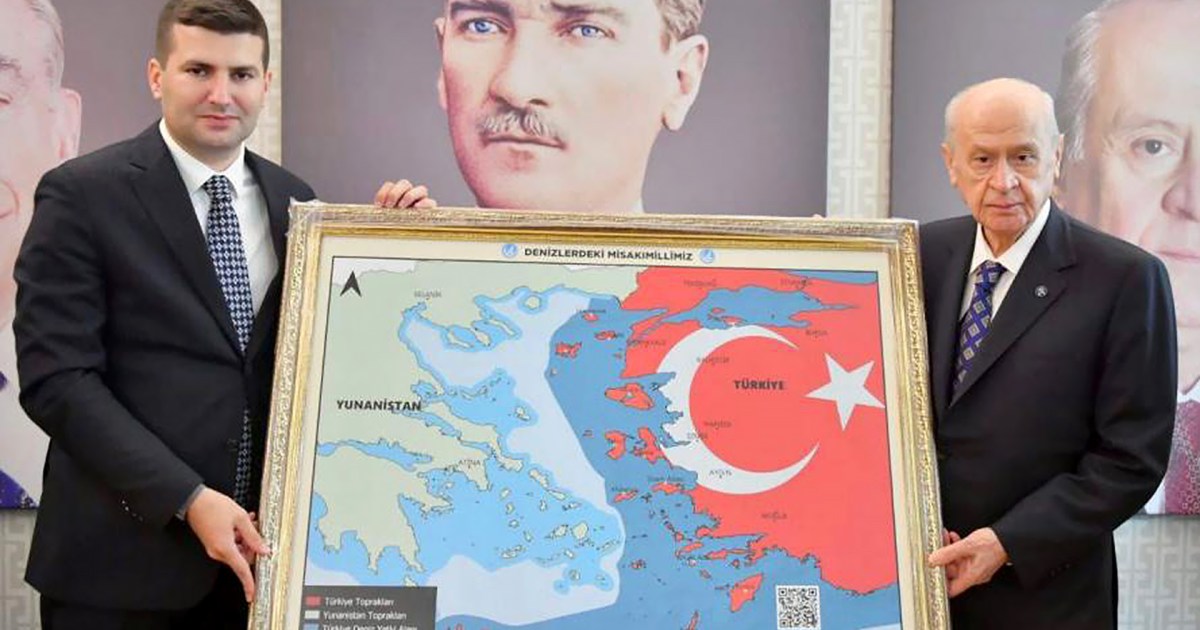Greek Prime Minister Kyriakos Mitsotakis accused, on Monday, Devlet Bahceli, leader of the "National Movement" party, partner in the ruling coalition in Turkey, of pursuing what he described as "expansionist policies" against the background of a picture of him with a map showing the Greek islands as Turkish.
Bahceli is shown in the picture next to a map that someone else gives him as a gift, showing all the islands of the eastern Aegean, along with Crete, the largest island in Greece, as Turkish land.
Ülkü Ocakları Genel Başkanı Ahmet Yiğit Yıldırım tarafından MHP Lideri Devlet Bahçeli'ye hediye edilen haritanın güzelliği 🇹🇷 pic.twitter.com/F8UUWoa0v2
— Kübra 🌙 🇹🇷 (@Kubra__571) July 11, 2022
Mitsotakis said - in a tweet on Twitter - that Erdogan should have clarified his position on these "recent strange opinions" by his "younger" partner in the coalition.
Take a good look at this map.
Crete, Rhodes, Lesvos, Chios, Samos all consumed by Turkey.
Α fever dream of extremists or Turkey's official policy?
Another provocation or the true goal?
President Erdogan must make his position clear on his junior coalition partner's latest antics.
pic.twitter.com/hX4sSZ924j
— Prime Minister GR (@PrimeministerGR) July 11, 2022
It is noteworthy that relations between the two neighboring countries that are members of the North Atlantic Treaty Organization (NATO) have been tense for months, and Turkish fighters fly almost daily over the Greek islands.
Ankara asserts that Greece is losing its sovereignty rights over the islands off the Turkish coast for deploying military units on them in violation of the 1923 Treaty of Lausanne and Paris in 1947.
History of the dispute over the Aegean Islands
The Treaty of Lausanne 1923 and Paris 1947 granted Greece sovereignty over the 12 islands, which are not more than 6 to 8 kilometers from the Turkish mainland, on the condition that Athens pledge not to arm them.
During the Lausanne Accord talks, Turkey insisted that Greece not arm the islands, in order to prevent Athens from considering attacking Turkish territory or posing any threat to it.
Under the 1947 Paris Agreement, the islands under Italian control were formally handed back to Greece, although Turkey was not one of the signatories to the agreement.
Meanwhile, the Soviet Union intervened and insistently demanded that Greece not arm the Aegean islands, and that Athens refrain from establishing any military base in them.
He justified his position by seeking to provide the security of Soviet warships while crossing this sea.
Greece adhered to its commitments to keep the islands demilitarized until conflicts broke out on the island of Cyprus in 1963 and 1964, when Turkey launched the "military peace" operation in Cyprus (April 1974) in order to protect the Turks from the attacks they were subjected to, so Athens began arming the islands under the pretext of the presence of A real threat from the Turkish side to its territorial integrity.

